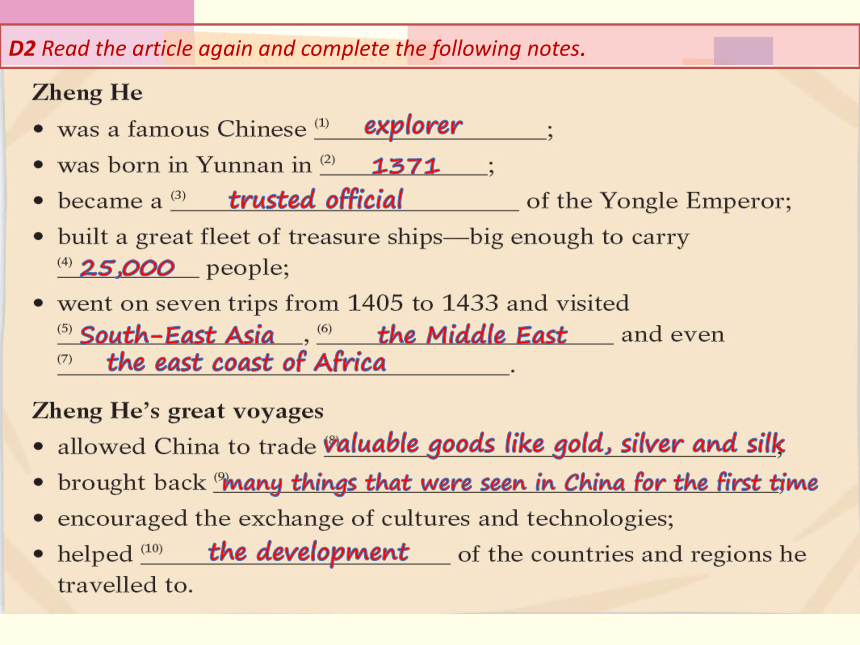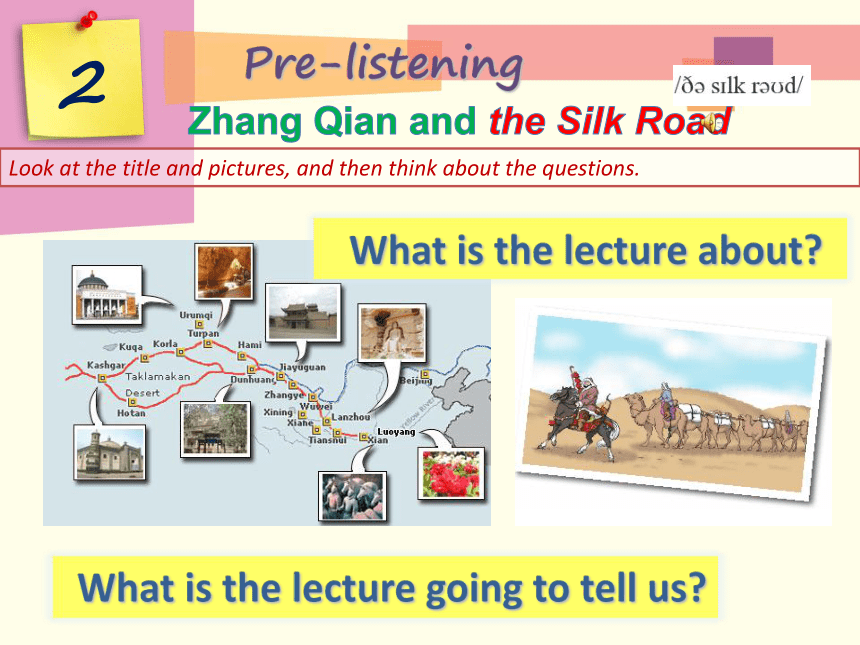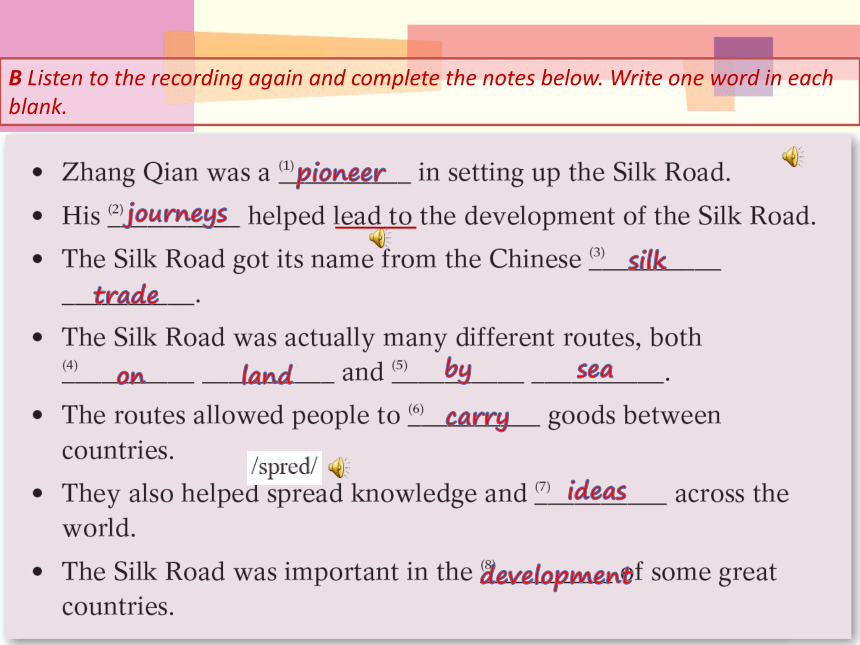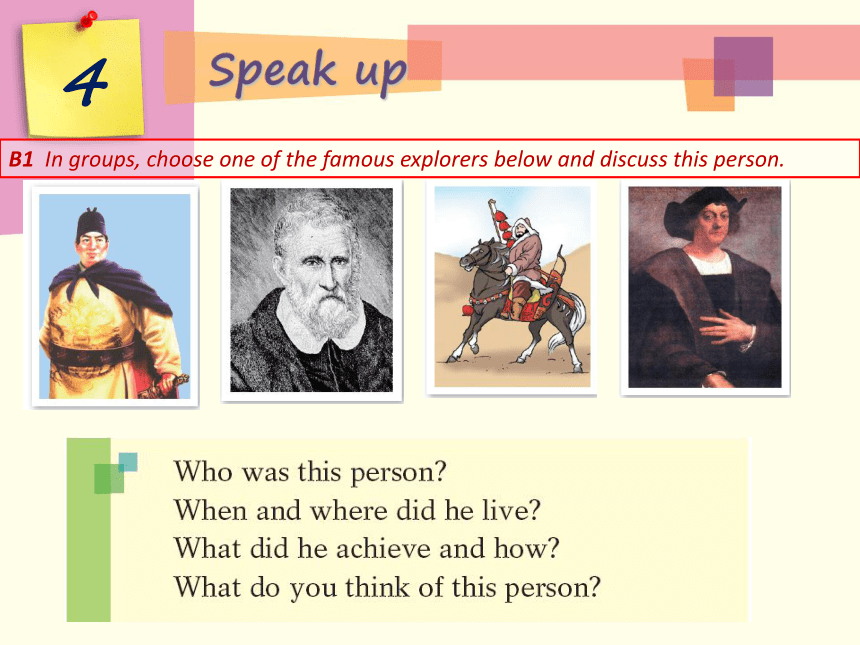牛津深圳版英语九下Module 1Unit 1 Period 3 Listening Speak up Talk time(共19张PPT)
文档属性
| 名称 | 牛津深圳版英语九下Module 1Unit 1 Period 3 Listening Speak up Talk time(共19张PPT) |

|
|
| 格式 | zip | ||
| 文件大小 | 13.6MB | ||
| 资源类型 | 教案 | ||
| 版本资源 | 牛津深圳版 | ||
| 科目 | 英语 | ||
| 更新时间 | 2016-10-14 00:00:00 | ||
图片预览







文档简介
课件19张PPT。Period 3Listening
Speak up
Talk timeModule 1 Explorations and exchangesOxford EnglishUnit
1Show time1Posters of Zheng HeZheng He and his great voyagesD2 Read the article again and complete the following notes.explorer1371trusted official25,000South-East Asiathe Middle Eastthe east coast of Africavaluable goods like gold, silver and silkmany things that were seen in China for the first timethe developmentLook at the title and pictures, and then think about the questions.Pre-listeningZhang Qian and the Silk Road4321 Who was Zhang Qian?
a An official in the Han Dynasty.
b A farmer in the Han Dynasty.
c A soldier in the Han Dynasty.
2 Why did the emperor send Zhang Qian to explore and open
routes to the outside world?
a To look for more wealth.
b To learn more about the far West.
c To find new countries.
A Listen to a lecture about Zhang Qian and the Silk Road. Then circle the correct answers to the questions below.3 When was the Silk Road started?
a Only 200 years ago.
b Over 2,000 years ago.
c About 1,000 years ago.
4 Which great country was not mentioned in the lecture?
a Greece. b Egypt. c India.Listening3B Listen to the recording again and complete the notes below. Write one word in each blank.pioneerjourneys silk
trade on land by seacarryideasdevelopment4Speak upB1 In groups, choose one of the famous explorers below and discuss this person.B2 In groups, make a brief introduction of the explorer to the class.Play a gameGuess who I am talking about.Talk time
Asking for repetition5Read the conversation below and practise it in pairs. Pay attention to the words in blue.Tony: Hi, Doris. How are you feeling?
Doris: A little better, thank you. I missed the History lesson about Zheng He today. Can you tell me what you learnt please?
Tony: Of course. Zheng He was born in Yunnan in 1371.
Doris: Sorry, could you repeat that please?
Tony: Sure. He was born in Yunnan in 1371. He built a great fleet of ships that could
carry as many as 25,000 people.
Doris: I beg your pardon. Did you say 24,000 people?
Tony: 25,000 people. He went on seven great voyages and traded valuable goods like
gold, silver and silk.
Doris: Sorry, I didn’t quite catch you. You said he traded gold, silver and …?
Tony: Silk. Zheng He brought back rare things to China, like pandas from Africa.
Doris: Pandas?
Tony: Sorry! What I meant to say was giraffes!
Doris: OK. What did you mean by “rare things”?
Tony: I meant things that there are not many of.
Doris: I see. That’s great. Thank you, Tony.
Tony: No problem. I hope you get better soon.Read the conversation below and practise it in pairs. Try to answer the questions.When Doris didn’t hear when and where Zheng He was born clearly, what did she say?Read the conversation below and practise it in pairs. Try to answer the questions.Tony: Hi, Doris. How are you feeling?
Doris: A little better, thank you. I missed the History lesson about Zheng He today. Can you tell me what you learnt please?
Tony: Of course. Zheng He was born in Yunnan in 1371.
Doris: Sorry, could you repeat that please?
Tony: Sure. He was born in Yunnan in 1371. He built a great fleet of ships that could
carry as many as 25,000 people.
Doris: I beg your pardon. Did you say 24,000 people?
Tony: 25,000 people. He went on seven great voyages and traded valuable goods like
gold, silver and silk.
Doris: Sorry, I didn’t quite catch you. You said he traded gold, silver and …?
Tony: Silk. Zheng He brought back rare things to China, like pandas from Africa.
Doris: Pandas?
Tony: Sorry! What I meant to say was giraffes!
Doris: OK. What did you mean by “rare things”?
Tony: I meant things that there are not many of.
Doris: I see. That’s great. Thank you, Tony.
Tony: No problem. I hope you get better soon.When Doris wasn’t sure about the number of people that the ships could carry, what did she say?Read the conversation below and practise it in pairs. Try to answer the questions.Tony: Hi, Doris. How are you feeling?
Doris: A little better, thank you. I missed the History lesson about Zheng He today. Can you tell me what you learnt please?
Tony: Of course. Zheng He was born in Yunnan in 1371.
Doris: Sorry, could you repeat that please?
Tony: Sure. He was born in Yunnan in 1371. He built a great fleet of ships that could
carry as many as 25,000 people.
Doris: I beg your pardon. Did you say 24,000 people?
Tony: 25,000 people. He went on seven great voyages and traded valuable goods like
gold, silver and silk.
Doris: Sorry, I didn’t quite catch you. You said he traded gold, silver and …?
Tony: Silk. Zheng He brought back rare things to China, like pandas from Africa.
Doris: Pandas?
Tony: Sorry! What I meant to say was giraffes!
Doris: OK. What did you mean by “rare things”?
Tony: I meant things that there are not many of.
Doris: I see. That’s great. Thank you, Tony.
Tony: No problem. I hope you get better soon.When Doris couldn’t remember all the valuable things that Zheng He traded, what did she say?Read the conversation below and practise it in pairs. Try to answer the questions.Tony: Hi, Doris. How are you feeling?
Doris: A little better, thank you. I missed the History lesson about Zheng He today. Can you tell me what you learnt please?
Tony: Of course. Zheng He was born in Yunnan in 1371.
Doris: Sorry, could you repeat that please?
Tony: Sure. He was born in Yunnan in 1371. He built a great fleet of ships that could
carry as many as 25,000 people.
Doris: I beg your pardon. Did you say 24,000 people?
Tony: 25,000 people. He went on seven great voyages and traded valuable goods like
gold, silver and silk.
Doris: Sorry, I didn’t quite catch you. You said he traded gold, silver and …?
Tony: Silk. Zheng He brought back rare things to China, like pandas from Africa.
Doris: Pandas?
Tony: Sorry! What I meant to say was giraffes!
Doris: OK. What did you mean by “rare things”?
Tony: I meant things that there are not many of.
Doris: I see. That’s great. Thank you, Tony.
Tony: No problem. I hope you get better soon.A rising intonation.When Doris thought that Tony’s answer was wrong, what did she say? What intonation did she use?Read the conversation below and practise it in pairs. Try to answer the questions.When Doris didn’t understand what “rare things” meant, what did she say?Tony: Hi, Doris. How are you feeling?
Doris: A little better, thank you. I missed the History lesson about Zheng He today. Can you tell me what you learnt please?
Tony: Of course. Zheng He was born in Yunnan in 1371.
Doris: Sorry, could you repeat that please?
Tony: Sure. He was born in Yunnan in 1371. He built a great fleet of ships that could
carry as many as 25,000 people.
Doris: I beg your pardon. Did you say 24,000 people?
Tony: 25,000 people. He went on seven great voyages and traded valuable goods like
gold, silver and silk.
Doris: Sorry, I didn’t quite catch you. You said he traded gold, silver and …?
Tony: Silk. Zheng He brought back rare things to China, like pandas from Africa.
Doris: Pandas?
Tony: Sorry! What I meant to say was giraffes!
Doris: OK. What did you mean by “rare things”?
Tony: I meant things that there are not many of.
Doris: I see. That’s great. Thank you, Tony.
Tony: No problem. I hope you get better soon.Read and learn the following expressions. Sorry, could you repeat that please?
I beg your pardon. Did you say ...?
Sorry, I didn’t quite catch you. You said ...?
What did you mean by ...?
Doris: Hi, Tony. I missed the History lesson today. Can you
tell me what you learnt, please?
Tony: Of course. We learnt about ____________.
Doris: Sorry, could you repeat that please?
Tony: Sure. We learnt about ___________.
He was a ___________.
Doris: Sorry, I didn’t quite catch you. You said __________?
Tony: _____________________________.
Doris: I beg your pardon. Did you say __________?
Tony: ___________________________.
Doris: What did you mean by ___________?
Tony: ___________________________.
Doris: Thank you so much.
In pairs, complete the conversation below.HHomework 1. 模仿录音的语音、语调,朗读Talk time部分的对话。
2. 两人一组,仿照Talk time部分的示例对话,就其他某位探险家的生平和探险经历编制对话,准备下节课汇报。
3. 完成《练习册》第六至七页Listening和第八页 Speaking 的练习。
Speak up
Talk timeModule 1 Explorations and exchangesOxford EnglishUnit
1Show time1Posters of Zheng HeZheng He and his great voyagesD2 Read the article again and complete the following notes.explorer1371trusted official25,000South-East Asiathe Middle Eastthe east coast of Africavaluable goods like gold, silver and silkmany things that were seen in China for the first timethe developmentLook at the title and pictures, and then think about the questions.Pre-listeningZhang Qian and the Silk Road4321 Who was Zhang Qian?
a An official in the Han Dynasty.
b A farmer in the Han Dynasty.
c A soldier in the Han Dynasty.
2 Why did the emperor send Zhang Qian to explore and open
routes to the outside world?
a To look for more wealth.
b To learn more about the far West.
c To find new countries.
A Listen to a lecture about Zhang Qian and the Silk Road. Then circle the correct answers to the questions below.3 When was the Silk Road started?
a Only 200 years ago.
b Over 2,000 years ago.
c About 1,000 years ago.
4 Which great country was not mentioned in the lecture?
a Greece. b Egypt. c India.Listening3B Listen to the recording again and complete the notes below. Write one word in each blank.pioneerjourneys silk
trade on land by seacarryideasdevelopment4Speak upB1 In groups, choose one of the famous explorers below and discuss this person.B2 In groups, make a brief introduction of the explorer to the class.Play a gameGuess who I am talking about.Talk time
Asking for repetition5Read the conversation below and practise it in pairs. Pay attention to the words in blue.Tony: Hi, Doris. How are you feeling?
Doris: A little better, thank you. I missed the History lesson about Zheng He today. Can you tell me what you learnt please?
Tony: Of course. Zheng He was born in Yunnan in 1371.
Doris: Sorry, could you repeat that please?
Tony: Sure. He was born in Yunnan in 1371. He built a great fleet of ships that could
carry as many as 25,000 people.
Doris: I beg your pardon. Did you say 24,000 people?
Tony: 25,000 people. He went on seven great voyages and traded valuable goods like
gold, silver and silk.
Doris: Sorry, I didn’t quite catch you. You said he traded gold, silver and …?
Tony: Silk. Zheng He brought back rare things to China, like pandas from Africa.
Doris: Pandas?
Tony: Sorry! What I meant to say was giraffes!
Doris: OK. What did you mean by “rare things”?
Tony: I meant things that there are not many of.
Doris: I see. That’s great. Thank you, Tony.
Tony: No problem. I hope you get better soon.Read the conversation below and practise it in pairs. Try to answer the questions.When Doris didn’t hear when and where Zheng He was born clearly, what did she say?Read the conversation below and practise it in pairs. Try to answer the questions.Tony: Hi, Doris. How are you feeling?
Doris: A little better, thank you. I missed the History lesson about Zheng He today. Can you tell me what you learnt please?
Tony: Of course. Zheng He was born in Yunnan in 1371.
Doris: Sorry, could you repeat that please?
Tony: Sure. He was born in Yunnan in 1371. He built a great fleet of ships that could
carry as many as 25,000 people.
Doris: I beg your pardon. Did you say 24,000 people?
Tony: 25,000 people. He went on seven great voyages and traded valuable goods like
gold, silver and silk.
Doris: Sorry, I didn’t quite catch you. You said he traded gold, silver and …?
Tony: Silk. Zheng He brought back rare things to China, like pandas from Africa.
Doris: Pandas?
Tony: Sorry! What I meant to say was giraffes!
Doris: OK. What did you mean by “rare things”?
Tony: I meant things that there are not many of.
Doris: I see. That’s great. Thank you, Tony.
Tony: No problem. I hope you get better soon.When Doris wasn’t sure about the number of people that the ships could carry, what did she say?Read the conversation below and practise it in pairs. Try to answer the questions.Tony: Hi, Doris. How are you feeling?
Doris: A little better, thank you. I missed the History lesson about Zheng He today. Can you tell me what you learnt please?
Tony: Of course. Zheng He was born in Yunnan in 1371.
Doris: Sorry, could you repeat that please?
Tony: Sure. He was born in Yunnan in 1371. He built a great fleet of ships that could
carry as many as 25,000 people.
Doris: I beg your pardon. Did you say 24,000 people?
Tony: 25,000 people. He went on seven great voyages and traded valuable goods like
gold, silver and silk.
Doris: Sorry, I didn’t quite catch you. You said he traded gold, silver and …?
Tony: Silk. Zheng He brought back rare things to China, like pandas from Africa.
Doris: Pandas?
Tony: Sorry! What I meant to say was giraffes!
Doris: OK. What did you mean by “rare things”?
Tony: I meant things that there are not many of.
Doris: I see. That’s great. Thank you, Tony.
Tony: No problem. I hope you get better soon.When Doris couldn’t remember all the valuable things that Zheng He traded, what did she say?Read the conversation below and practise it in pairs. Try to answer the questions.Tony: Hi, Doris. How are you feeling?
Doris: A little better, thank you. I missed the History lesson about Zheng He today. Can you tell me what you learnt please?
Tony: Of course. Zheng He was born in Yunnan in 1371.
Doris: Sorry, could you repeat that please?
Tony: Sure. He was born in Yunnan in 1371. He built a great fleet of ships that could
carry as many as 25,000 people.
Doris: I beg your pardon. Did you say 24,000 people?
Tony: 25,000 people. He went on seven great voyages and traded valuable goods like
gold, silver and silk.
Doris: Sorry, I didn’t quite catch you. You said he traded gold, silver and …?
Tony: Silk. Zheng He brought back rare things to China, like pandas from Africa.
Doris: Pandas?
Tony: Sorry! What I meant to say was giraffes!
Doris: OK. What did you mean by “rare things”?
Tony: I meant things that there are not many of.
Doris: I see. That’s great. Thank you, Tony.
Tony: No problem. I hope you get better soon.A rising intonation.When Doris thought that Tony’s answer was wrong, what did she say? What intonation did she use?Read the conversation below and practise it in pairs. Try to answer the questions.When Doris didn’t understand what “rare things” meant, what did she say?Tony: Hi, Doris. How are you feeling?
Doris: A little better, thank you. I missed the History lesson about Zheng He today. Can you tell me what you learnt please?
Tony: Of course. Zheng He was born in Yunnan in 1371.
Doris: Sorry, could you repeat that please?
Tony: Sure. He was born in Yunnan in 1371. He built a great fleet of ships that could
carry as many as 25,000 people.
Doris: I beg your pardon. Did you say 24,000 people?
Tony: 25,000 people. He went on seven great voyages and traded valuable goods like
gold, silver and silk.
Doris: Sorry, I didn’t quite catch you. You said he traded gold, silver and …?
Tony: Silk. Zheng He brought back rare things to China, like pandas from Africa.
Doris: Pandas?
Tony: Sorry! What I meant to say was giraffes!
Doris: OK. What did you mean by “rare things”?
Tony: I meant things that there are not many of.
Doris: I see. That’s great. Thank you, Tony.
Tony: No problem. I hope you get better soon.Read and learn the following expressions. Sorry, could you repeat that please?
I beg your pardon. Did you say ...?
Sorry, I didn’t quite catch you. You said ...?
What did you mean by ...?
Doris: Hi, Tony. I missed the History lesson today. Can you
tell me what you learnt, please?
Tony: Of course. We learnt about ____________.
Doris: Sorry, could you repeat that please?
Tony: Sure. We learnt about ___________.
He was a ___________.
Doris: Sorry, I didn’t quite catch you. You said __________?
Tony: _____________________________.
Doris: I beg your pardon. Did you say __________?
Tony: ___________________________.
Doris: What did you mean by ___________?
Tony: ___________________________.
Doris: Thank you so much.
In pairs, complete the conversation below.HHomework 1. 模仿录音的语音、语调,朗读Talk time部分的对话。
2. 两人一组,仿照Talk time部分的示例对话,就其他某位探险家的生平和探险经历编制对话,准备下节课汇报。
3. 完成《练习册》第六至七页Listening和第八页 Speaking 的练习。
